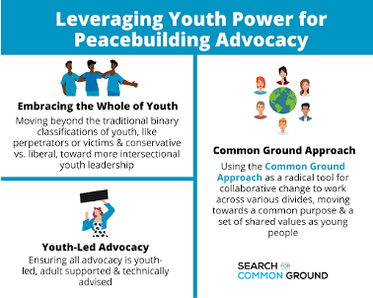 Authors: Lani Anaya and Carolyn Williams- Search for Common Ground This blog serves to outline the process of YPS advocacy in the U.S. and some of the present challenges facing YPS integration from a youth and non-youth perspective. The authors are independent peacebuilding consultants and YPS experts working with the Search for Common Ground Children and Youth Department on YPS advocacy in the United States. A new social movement has arrived in the United States – one driven by thousands of young people globally aiming to prevent, mitigate, and resolve violent conflict in their communities through creating a meaningful intergenerational collaboration for peace. The Youth, Peace and Security (YPS) agenda seeks to gain recognition of the unique needs and abilities of young people and to garner support for local and global policies that are youth inclusive and youth sensitive. Articulated by the global youth movement, YPS focuses on the positive and innovative contributions of youth in peace and security, particularly peacebuildin g and humanitarian development, which sets it apart from other children and adolescent-focused policies. YPS also carves out necessary space for the role of young people aged 15-29 (definition of youth varies across cultural contexts, the U.S. considers youth as 18-29 years old). Realities and leadership of young people in conflict Since 2010, the number of major armed conflicts has tripled with 1-in-4 youth affected (Uppsala Conflict Database Program, 2020). A recent study forecasted COVID-19’s devastating impacts could plunge 13 more countries into conflict through 2022—a 56% increase compared to pre-pandemic estimates. It is well established that violence, conflict, COVID-19, climate, and environmental change disproportionately impact youth across contexts. Additionally, young people who experience these dire circumstances are at greater risk of harm, including sexual violence and other forms of abuse, orphanhood, learning loss, and lack of nutrition and health services. Youth have witnessed global diplomacy and security failures that directly impact their wellbeing, livelihoods, opportunities, and safety due to antagonistic and exclusive approaches to peace and security. In this time of compounding crisis, although young people are often portrayed as mere beneficiaries of aid or perpetrators of violence, youth are actively playing an integral role in building sustainable peace and security. From co-creating new policies and programs with adult allies to meditating on conflict in their communities to ensuring equal access and distribution of critical resources, young people are not just the future but serve as a present-day change-makers and partners for breaking cycles of violence. How did YPS come to fruition? In 2015, United Nations Security Council Resolution (UNSCR) 2250 formally recognized that “young people play an important and positive role in the maintenance and promotion of international peace and security” on a global scale. This first-ever youth and peace-oriented resolution urged governments to give youth a greater voice in decision-making at the local, national, regional, and international levels. It also urged member states to consider setting up mechanisms that would enable young people to participate meaningfully in peace processes by identifying five key pillars for action: participation, protection, prevention, partnerships, and disengagement and reintegration. Two additional UN Security Council resolutions, UNSCR 2419 (2018) and 2535 (2020) further reiterate the need for facilitating meaningful participation and protection of young peacebuilders, respectively. Over the last ten years, YPS has been adopted and enhanced by actions taken by multilateral organizations and national governments that recognize the critical role young people play in creating and sustaining peace. During 2021, both Finland and Nigeria achieved landmark progress for youth and peace by adopting National Action Plans institutionalizing YPS in domestic and foreign affairs. This recognition of the positive role youth play as agents of social change and drivers of peace is both timely and strategic given the state of global affairs and the potential of young people - when meaningfully engaged - to unlock cycles of violence. However, much more needs to be done. Bringing YPS to the United States Intergenerational partnerships should aim to equip youth with the “networks, skills, opportunities, and resources to revitalize democracy, tackle climate change, lead pandemic and humanitarian prevention and response efforts in their communities, innovate on skills for entrepreneurship and employment, and much more” according to the USAID Senior Advisor on Youth. Yet, the United States has not adopted YPS policy nor has a coherent youth engagement strategy. However, through sustained advocacy by the U.S. YPS Coalition and a growing transnational, youth-led advocacy movement, we hope to change that position. The latest YPS resolution (UNSCR 2535 on youth protection) has inspired youth advocates to call for U.S. implementation of the YPS agenda through policy that includes provisions for funding opportunities, the meaningful participation of young people, and the creation of new protection mechanisms to support youth in shrinking civic spaces worldwide. In 2019, Search for Common Ground launched the U.S. YPS Coalition, which it now co-chairs alongside STAND: The Student-Led Movement to End Mass Atrocities, and now comprises over 75 youth-led and youth-serving organizations. Building on growing U.S. youth-led interest and momentum, the U.S. YPS Coalition began advocating in Congress for the bipartisan Youth, Peace, and Security Act in 2017 The YPS Act formally recognizes the integral role of youth in sustainable peace and security and aims to institutionalize and mainstream YPS across the U.S. government. The YPS Act presents strategies to engage youth meaningfully and builds on and complements recent bipartisan prevention-oriented legislation, such as the Global Fragility Act and the Women, Peace, and Security Act, to ensure youth are part of the U.S. government’s integrated solution to reducing violence, preventing conflict, and advancing peace and international security. The YPS Act was initially introduced in 2020 by Rep. Grace Meng (D-NY), with bipartisan support from Rep. Susan Brooks (R-IN), Rep. Dean Phillips (D-MN), and Rep. John Curtis (R-UT) during the 116th Congress and re-introduced in summer of 2021 under the bipartisan leadership of Rep. Grace Meng (D-NY), with bipartisan support from Brian Fitzpatrick (R-PA), Rep. Dean Phillips (D-MN), and Rep. John Curtis (R-UT) The bill now stands with 16 sponsors in the House and the Coalition aims to move towards a House floor vote and a Senate introduction of a companion bill in the Summer of 2022. To advance this progress, the Children’s Policy and Funding Initiative is supporting Search for Common Ground, in collaboration with the U.S. YPS Coalition, to enable youth-led initiatives focused on conducting advocacy and creating recommendations for mainstreaming YPS into U.S. policy. The advocacy efforts are informed by research including key informant interviews, and consultations with YPS actors, researchers, and policymakers. By facilitating multi-level discussions of YPS entry points in U.S. policy, we formed a basis of support for young people and the YPS agenda among key U.S. government actors and provided evidence-based policy recommendations, including:
Looking forward Building on this momentum, Search for Common Ground aims to not only build on and expand this progress in relation to advancing legislation and youth-driven advocacy but also enhance our work on protection and intergenerational collaboration. The recent ‘If I Disappear’ report by the UN Secretary General’s Office of the Envoy launched Summer of 2021 on Youth documented major protection issues facing young people in civic spaces worldwide for the first time ever. Due to their age (15-29), young people do not qualify for traditional child protection mechanisms and youth typically fall through existing adult protection mechanisms due to the inability of these frameworks and systems to adequately address the barriers and threats that youth face. Sexual and gender-based violence is widespread in conflict zones. While young women and girls have had a comprehensive focus on their protection in civic spaces, and continue to be the main focus in our protection due to their unique vulnerabilities, young men and boys and sexual and gender minorities have fallen through the cracks – a dangerous trend we hope to curb in our advocacy to look at the impact of sexual violence on all youth. Understanding SGBV against young people requires a critical understanding of the harmful patriarchal attitudes that affect the rights, dignity, and agency of young people. Under the Children and Youth Initiative, the U.S. YPS Coalition has been championing protection issues in our advocacy, including facilitating Congressional Dear Colleague letters on pushing the U.S. government to adopt broader protection mechanisms to support the unique complexities of the youth demographic in civic spaces. We hope to build on this momentum and leverage our roles as co-chairs of the Global Youth Protection Working Group to build the necessary frameworks and mechanisms to enhance youth protection. Based on the research and dialogues we held to inform our policy briefs and research, we noticed a hunger for opportunities to enhance intergenerational collaboration for YPS in the United States. Through launching a “YPS Adult Champions Network,” we hope to create a space to educate adult practitioners and policymakers on YPS, hold more dialogues to ensure young people and adults are co-creating opportunities and policies for meaningful youth inclusion, and break down stereotypes and disruptive socio-cultural norms that prevent intergenerational action. This effort is a unique opportunity to connect local communities and the global frameworks of YPS via a national approach to institutionalize YPS in U.S. government policy and funding. By mainstreaming YPS, youth will contribute to strengthening and sensitizing national and foreign U.S. policy while enhancing community-based strategies. When governments recognize and institutionalize meaningful youth participation and engagement, the impact of young people’s efforts to drive democracy, peace, and security increases drastically due to a more enabling environment and access to spaces of decision-making and political influence. This is not only a morally driven agenda but a demographic opportunity for the U.S. to shift its’ global engagement and efforts for peace. AuthorsLani Anaya and Carolyn Williams- Search for Common Ground
0 Comments
|
ArchivesCategories |


 RSS Feed
RSS Feed
